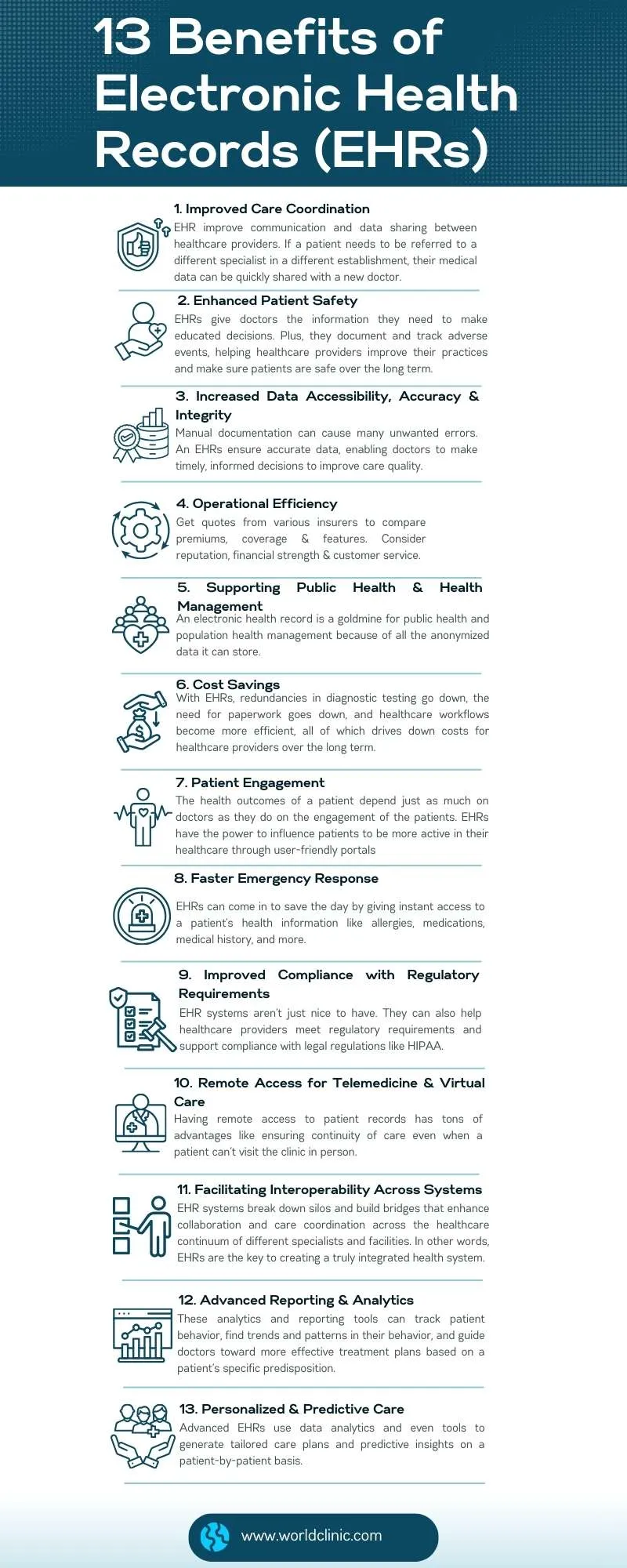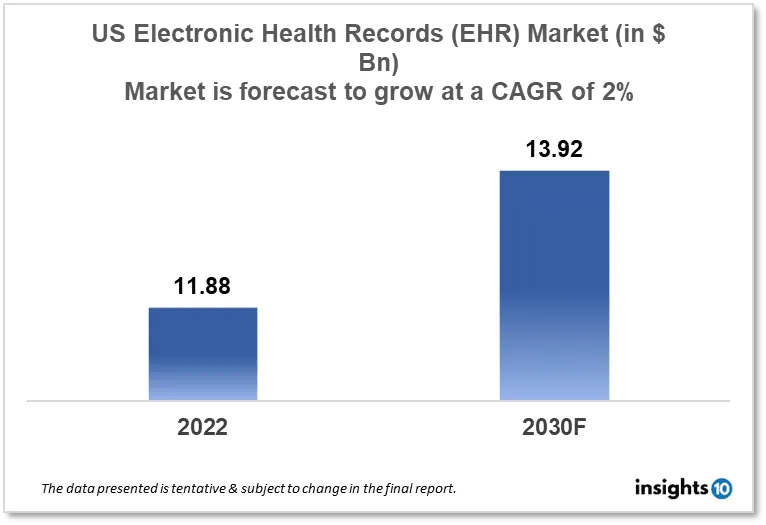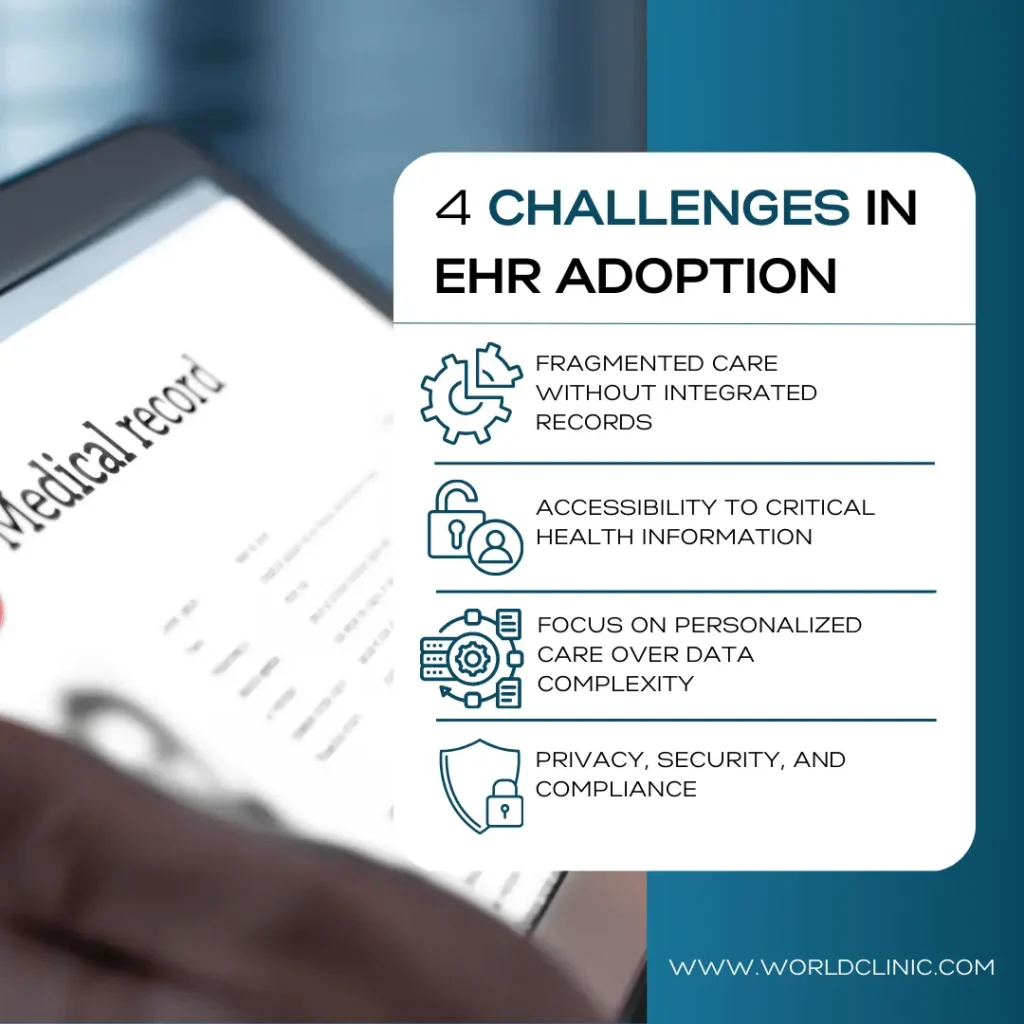Healthcare is changing day by day. This shift is majorly thanks to technological advancements and innovation. Technology makes healthcare better in many ways, and the introduction of EHRs (Electronic Health Records) is no exception.
What are EHRs and how do they improve the world of healthcare? Well, these systems govern the way health data is gathered, stored, accessed, shared, and more.
From fostering better communication between healthcare providers to making patient care and coordination more holistic, the benefits of electronic health records are many.
In this blog, we will tell you all about EHRs, 13 of their advantages, how they are impacting the world of healthcare, and much more. Let’s dive right in.
What are Electronic Health Records?
Electronic Health Records (EHRs) are digital systems that came to replace traditional paper-based charts in hospitals and other healthcare establishments. They store all patient data securely and efficiently.
You can think of EHRs as centralized hubs that give real-time access to your medical history, patient demographics, test results, treatment plans, and more.
In an ideal world, EHRs are perfectly secure online systems that offer interoperability between healthcare providers.
Back in 2009, less than around 8% of hospitals were using an EHR. Just 3 years later, the number grew to 69%. This shift was accelerated further after the COVID-19 pandemic. As of 2021, 88.2% of office-based physicians use an EHR. And this number is still growing.
So why are electronic health records important and why do 75% of healthcare patients prefer digital tools? Let’s talk about all the benefits of EHR systems.
13 Benefits of Electronic Health Records
With the widespread adoption of EHRs, it’s obvious that they bring a lot of benefits to both patients and medical providers. Let’s do a deep dive into the key benefits of electronic health records to help you understand how and why they are changing healthcare.

1. Improved Care Coordination
The first benefit you need to know about EHRs is that they improve communication and data sharing between healthcare providers. If a patient needs to be referred to a different specialist in a different establishment, their medical data can be quickly shared with a new doctor.
With an EHR, patient information is centralized, and care coordination is made easy. Every relevant doctor can have access to accurate and up-to-date records about the patient. Ultimately, this:
- Reduces errors and redundant testing
- Improves continuity of care
- Helps both patients and doctors save time
Especially for patients with chronic conditions, having their history documented and accessible to different specialists is key to more efficient treatment plans and even better patient outcomes.
2. Enhanced Patient Safety
The benefits of electronic health records don’t just end at storing and sharing data. With all this information being available in 1 centralized location, analytics can find drug interactions, allergies, and even duplicate prescriptions to send alerts to doctors.
Ultimately, EHRs help to greatly reduce medication errors, which makes sure patients stay safe in their healthcare journey.
EHRs give doctors the information they need to make educated decisions. Plus, they document and track adverse events, helping healthcare providers improve their practices and make sure patients are safe over the long term.
3. Increased Data Accessibility, Accuracy and Integrity
We’ve already discussed how EHRs give doctors and healthcare providers access to patient data quickly and from any location. With these digital systems, data is made sure to be accurate and maintains its integrity thanks to the lack of human error.
Manual documentation can cause many unwanted errors. An EHR can make sure that data is accurate and processed effectively. Ultimately, this gives doctors reliable data, which they can use to make timely, data-backed decisions to enhance the quality of care.
On top of all that, EHRs have patient portals that can empower patients to engage with their own health more. It’s a win-win system.
4. Operational Efficiency
Yes, the benefits of electronic health records for patients are clear. However, healthcare providers get just as much of a push with EHRs that can automate admin tasks like:
- Scheduling
- Billing
- Compliance reporting
- Much more
With all of these tasks being done without manual labor, healthcare staff can put a bigger focus on patient care. Ultimately, there will be fewer delays and errors, which can result in shorter wait times and more satisfied patients.
And of course, we can’t forget that digitizing patient records helps with organization, saves storage costs, and boosts overall productivity by taking care of manual tasks.
5. Supporting Public Health and Population Health Management
An electronic health record is a goldmine for public health and population health management because of all the anonymized data it can store. This data can be used to identify health trends and drive government strategies for public health.
EHRs can track disease outbreaks, vaccination rates, and any emerging health threats to help enable quick and targeted responses.
When it comes to population health management, EHRs can find specific patterns like the prevalence of chronic diseases or identify at-risk groups for preventive interventions.
All this info can be used to improve the health of both local communities and entire populations. From designing targeted interventions to better allocating resources, this medical data hub can boost healthcare equity and improve public health policies.
6. Cost Savings
Another one of the best advantages of EHR systems is cost savings for both patients and providers.
With EHRs, redundancies in diagnostic testing go down, the need for paperwork goes down, and healthcare workflows become more efficient, all of which drives down costs for healthcare providers over the long term.
Ultimately, investing in an EHR system for your healthcare clinic can have a positive ROI. As for patients, the cost benefits of EHRs come from faster and better billing processes which reduce out-of-pocket spending.
7. Patient Engagement
The health outcomes of a patient depend just as much on doctors as they do on the engagement of the patients. EHRs have the power to influence patients to be more active in their healthcare through user-friendly portals. Patients can access their:
- Medical records
- Health metrics
- Test results
- Appointments scheduled
- Communication with providers
Overall, this transparency fosters trust between doctors and patients. By giving patients greater control over their health data, EHRs indirectly influence them to better adhere to their treatment plans and preventive procedures.
8. Faster Emergency Response
During an emergency, every second counts. EHRs can come in to save the day by giving instant access to a patient’s health information like allergies, medications, medical history, and more. With this data at hand, providers can help a patient quickly and accurately.
Understanding that this sort of access to data can save lives makes another one of the benefits of electronic health records abundantly clear. From preventing adverse allergic reactions to understanding the chronic conditions of patients, EHRs have immense value.
9. Improved Compliance with Regulatory Requirements
EHR systems aren’t just nice to have. They can also help healthcare providers meet regulatory requirements and support compliance with legal regulations like HIPAA.
Thanks to their secure storage and management of patient data, EHRs give healthcare providers one less thing to think about. On top of that, they help comply with reporting deadlines and other requirements through automated reminders and alerts.
Overall, using an EHR system helps healthcare providers reduce the risk of legal or financial penalties. As an added bonus, it also helps to boost your trust factor with patients by showing your commitment to data security and privacy.
10. Remote Access for Telemedicine and Virtual Care
If a healthcare provider is using telemedicine and virtual care portals, an EHR system upgrade is just what the doctor ordered. They seamlessly integrate with telemedicine platforms and give providers all the patient data they need during virtual consultations.
Having remote access to patient records has tons of advantages like ensuring continuity of care even when a patient can’t visit the clinic in person. The same applies to patients living in rural or underserved areas.
For users of membership medicine that rely on remote access for healthcare or chronic care management, this is an undeniable advantage. From improving outcomes to reducing disparities, EHRs are simply a game-changer.
11. Facilitating Interoperability Across Systems
Care coordination is one side of the puzzle in modern healthcare, and interoperability is non-negotiable for sharing patient data. EHRs connect disparate healthcare systems and let data flow seamlessly between hospitals, clinics, and pharmacies.
This interoperability reduces administrative delays and ensures that all providers involved in a patient’s care have consistent and accurate information. Let’s be honest – this wouldn’t be possible with paper-based patient records fragmented across providers.
EHR systems break down silos and build bridges that enhance collaboration and care coordination across the healthcare continuum of different specialists and facilities. In other words, EHRs are the key to creating a truly integrated health system.
12. Advanced Reporting and Analytics
Another one of the benefits of electronic health records we want to cover is the powerful analytics and reporting tools that are built into EHRs. They can identify trends and track patient outcomes, ultimately optimizing the way care is delivered to patients.
These analytics and reporting tools can track patient behavior, find trends and patterns in their behavior, and guide doctors toward more effective treatment plans based on a patient’s specific predisposition.
Here, personal well-being is not the end of the story. These advanced insights can even support research initiatives, influence policy decisions, help identify care gaps and much more.
13. Personalized and Predictive Care
Lastly, let’s talk about one of the major concierge medicine trends that is, yet again, transforming how healthcare is delivered. Healthcare is no longer a one-size-fits-all solution, and personalized, preventive care is king now.
Advanced EHRs use data analytics and even tools to generate tailored care plans and predictive insights on a patient-by-patient basis. With predictive tools, doctors can identify health risks early and intervene proactively before things get worse.
Customizing treatment protocols based on patient history is another amazing feature of EHRs. Overall, this new and improved approach makes sure that healthcare is custom fitted to each patient’s unique needs, helping patients get healthier faster.
The Impact of EHRs on the Healthcare Industry
Now that we’ve covered most of the advantages of electronic health records, let’s now talk about the footprint they’re leaving on the healthcare industry as a whole.
The current healthcare system is far from perfect. Patients need to wait days and sometimes weeks to get an appointment with their doctors, and doctors are in burnout due to the overwhelming number of patients they need to care for.
Luckily, EHRs are here to help. We shouldn’t think of these systems as tools for individual providers. Instead, they have the power to leave their mark on the whole healthcare world by:
- Reducing hospital readmissions by ensuring continuity of care and tracking patient progress remotely
- Optimizing resource allocation using data insights to deploy resources where they are most needed.
- Informing public health strategies and improving policy outcomes thanks to aggregated data
While EHRs have an abundance of benefits, they are still not magic. Their adoption has been slow and complicated, but concierge primary care clinics that use advanced telehealth solutions already might have a solution.

Bridging the Gap: 4 Challenges in EHR Adoption and How Concierge Medicine Provides Solutions
The challenges that come with adopting EHRs are many. From data silos to user training requirements and technical problems, EHR systems are far from becoming the ultimate hub for patient data.
Luckily, solutions exist for healthcare providers and patients who want to experience the benefits of EHR systems. Let’s explore some of the key challenges and solutions of adopting EHRs.

1. Fragmented care without integrated records
While EHRs aim to have a centralized data point for medical records, there are challenges like data silos and interoperability issues that can hinder care coordination.
With concierge medicine serving as a single point of contact, patients don’t need to worry about sharing their data with different providers. All medical information, even across different providers, is effectively coordinated by your concierge medicine clinic without relying on complex EHR systems.
2. Accessibility to critical health information
Since EHRs are not the rule of the law, they still might have technical failures or lack integration capabilities during emergencies where instant access to patient data is critical.
Concierge medicine solves this issue by giving patients 24/7, global access to physicians who are already familiar with each patient’s medical history. This way, critical information is always available when it matters the most.
3. Focus on personalized care over data complexity
EHR systems can be efficient, but they can also prioritize data entry over the patient-provider relationship sometimes. This results in less personalized care, defeating one of the major purposes of the system.
In a concierge medicine clinic like WorldClinic, we focus on direct, tailored interactions between patients and doctors. Our primary goal is to give our patients human-centered and holistic care that leverages secure systems to support their individual needs.
4. Privacy, security, and compliance
Just like with all technological advancements that deal with sensitive data, privacy, and security are major concerns. While EHRs are built to comply with such measures, concierge medicine has been in the game for much longer.
Regulations like HIPAA compliance are imperative in a field like healthcare. When it comes to tried and tested solutions, concierge medicine is a better way to go.
With so many benefits to concierge medicine overlapping with the benefits of EHRs, adopting one or the other can be challenging. While concierge medicine isn’t here to replace EHRs, it still overcomes many of the hurdles that come with adopting an EHR system for your practice.
Conclusion
Electronic health records are transforming modern healthcare in many ways. From better care coordination to streamlined workflows for providers, you couldn’t count the benefits of electronic health records on both your hands.
While there are still challenges that come with its adoption, integrating EHRs is still a promising endeavor for the whole healthcare industry. Of course, there are ways to overcome these challenges like investing in concierge medical services.
As a WorldClinic member, you’ll experience the benefit of secure and summarized EMRs, which provide much more personalization, accessibility, and privacy. Plus, they allow doctors to really get to know you as their patient to facilitate high-quality care coordination.
If you’re a patient looking to explore your options, we recommend exploring our membership plans for 24/7, global access to high-quality medical care.
FAQs about Electronic Health Records (EHRs)
1. What role do EHRs play in enhancing care coordination?
EHRs make care coordination easier by centralizing patient information in 1 place and making it accessible to all authorized healthcare providers. This means that doctors, specialists, and other care team members always have up-to-date data. Ultimately, this reduces errors, helps skip redundant tests, and improves health outcomes for patients.
2. Can electronic health records reduce healthcare costs?
Yes, reducing healthcare costs for both patients and providers is one of the benefits of electronic health records. EHRs eliminate redundant diagnostic tests, handle admin tasks to minimize overheads, and much more. They can also prevent expensive medical errors by sending alerts for drug interactions or allergies.
3. How do electronic health records support preventive care?
EHRs have built-in tools like reminders for routine screenings, vaccinations, and wellness check-ups. This helps providers be proactive and identify early warning signs of health issues. Ultimately, doctors can intervene in a timely manner, saving costly procedures over the long term.
4. Why are EHRs essential for modern telemedicine services?
EHRs have endless benefits, including their ability to integrate with telemedicine platforms. This combination gives doctors real-time access to patient data during virtual consultations and helps them give more accurate diagnoses and treatment plans. On the road to a more efficient and effective healthcare industry, EHRs have a huge role to play.
5. How do EHRs assist in population health management?
EHRs can aggregate and analyze anonymized patient data, which can be used to find trends in health conditions, disparities, and resource needs within local communities and specific populations. Based on this data, governments can implement targeted interventions and preventive care initiatives.
6. Are electronic health records accessible to patients directly?
Yes, EHR systems usually have patient portals where you can see your medical records, view your test results, schedule appointments, and even communicate with your provider directly.


